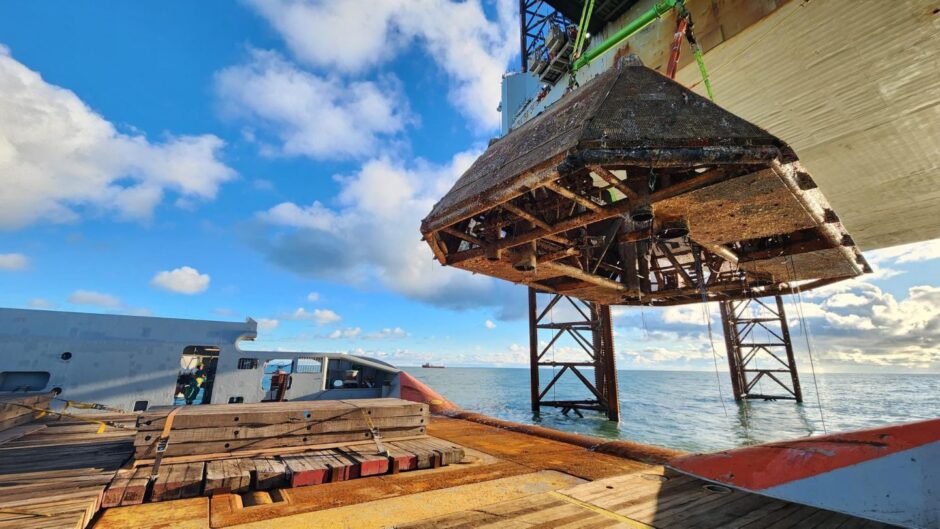 © Supplied by Perenco
© Supplied by Perenco The North Sea has been a powerhouse of oil and gas production for over five decades.
As fields mature and production declines, the decommissioning of wells has become a pressing issue for operators, regulators, and environmental stakeholders.
The North Sea is home to thousands of wells that are nearing or have already reached the end of their productive life.
According to the UK North Sea Transition Authority (NSTA) the total estimated cost of decommissioning these wells is projected to exceed £50 billion by 2035 and a significant portion will fall directly on operators’ capital budget sheets.
The cost burden is expected to grow as more wells reach the end of their life and the competition for decommissioning services increases.
Decommissioning wells as soon as is practical after production ceases is crucial from an environmental and safety perspective and an economic standpoint.
The urgency to act swiftly is compounded by the high costs associated with delaying action and the environmental risks of leaving wells unsealed.
There is a requirement for innovative and disruptive solutions to manage this growing challenge.
One of the most compelling reasons is the potential environmental risk posed by shut in and degrading wellbores over time.
Oil and gas wells change state as field production is shut down.
If left unchecked, a wellbore can experience enhanced degradation as surrounding geology reacts to a new static state.
This could result in the release of previously contained hydrocarbons or other harmful substances into the surrounding environment as the wellbore settles in a new static regime.
In the North Sea, this is especially concerning given its fragile marine ecosystem.
Additionally, older wells often have deteriorating subsea infrastructure, making them more prone to such leaks.
This can also contribute significantly to greenhouse gas emissions, particularly methane, a far more potent greenhouse gas than CO₂.
Unsealed wells can continue to release methane long after production has ceased, exacerbating climate change.
With the global focus on reducing emissions and the energy transition towards cleaner alternatives, responsible well decommissioning becomes a vital part of this broader effort to meet climate goals.
The economic costs of delaying well decommissioning are also considerable.
Operators may be tempted to postpone decommissioning to spread capital expenditure or wait for new methods and technology, however, this often results in higher costs in the long run.
The longer a well is left without being properly plugged and abandoned, the more complicated and expensive the decommissioning process becomes.
Ageing infrastructure increases the complexity of the decommissioning process. As wells deteriorate, the risk of leaks and other environmental damage increases, which can result in costly clean-up programmes, fines, legal liabilities, and reputational damage for the companies involved.
It is far more economically viable to decommission a well when infrastructure is still intact and easier to manage.
Early decommissioning can reduce costs by up to 15-20%.
The scale of the decommissioning challenge in the North Sea cannot be overstated.
More than 10,000 wells are expected to be plugged and abandoned in the next few decades, with a significant portion of these located in the UK and Norwegian sectors of the North Sea.
The logistics of coordinating decommissioning projects at this scale are daunting, and costs will only rise if operators delay action.
Public perception is also increasingly shaping the way oil and gas companies approach decommissioning.
With growing awareness of the environmental impact of fossil fuels, there is mounting pressure on companies to demonstrate their commitment to responsible resource management.
Decommissioning wells promptly and effectively is one way for companies to show that they are taking their environmental responsibilities seriously.
This can also help protect their brand reputation and maintain positive relationships with regulators, investors, and the public.
While decommissioning wells is undoubtedly a costly endeavour, there are significant economic benefits to acting promptly.
Companies that decommission wells sooner rather than later can take advantage of current market conditions where decommissioning services may be more competitively priced.
As the demand for decommissioning services increases in the coming years, particularly in the North Sea, costs are likely to rise.
Early action allows operators to avoid the higher prices and longer wait times associated with a crowded decommissioning market.
Additionally, timely decommissioning can free up resources and capital that can be reinvested in other projects, including renewable energy initiatives.
Many oil and gas companies are already transitioning toward cleaner energy solutions, and reducing their decommissioning liabilities can provide the financial flexibility needed to accelerate this shift.
In the context of the North Sea’s vast decommissioning challenge, immediate action is essential.
The costs of inaction are simply too high – for the environment, for operators, and for society as a whole.

